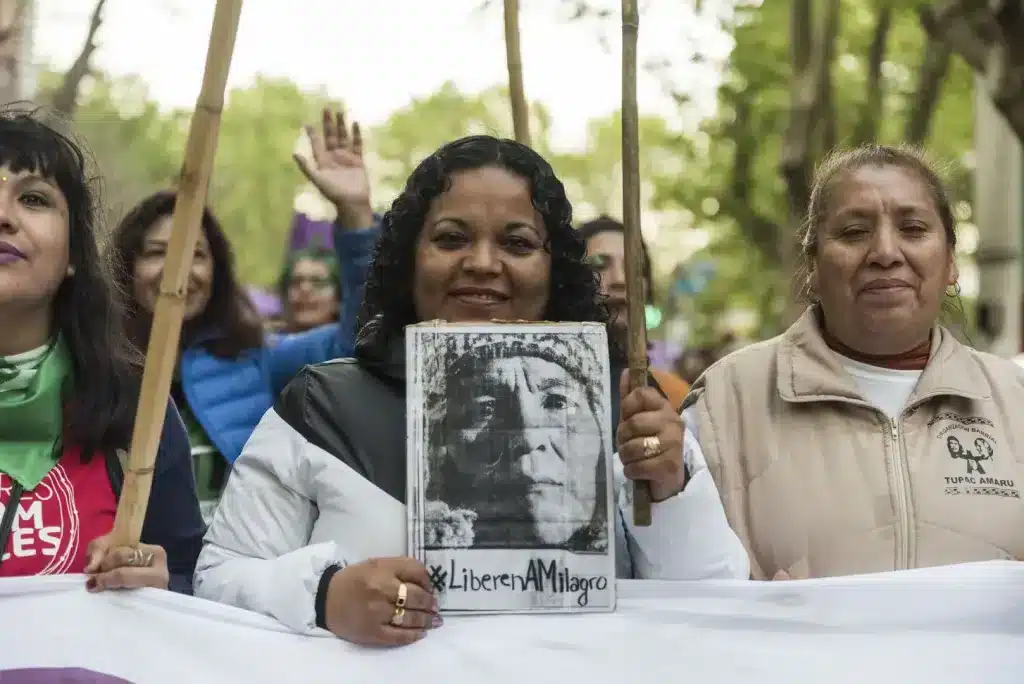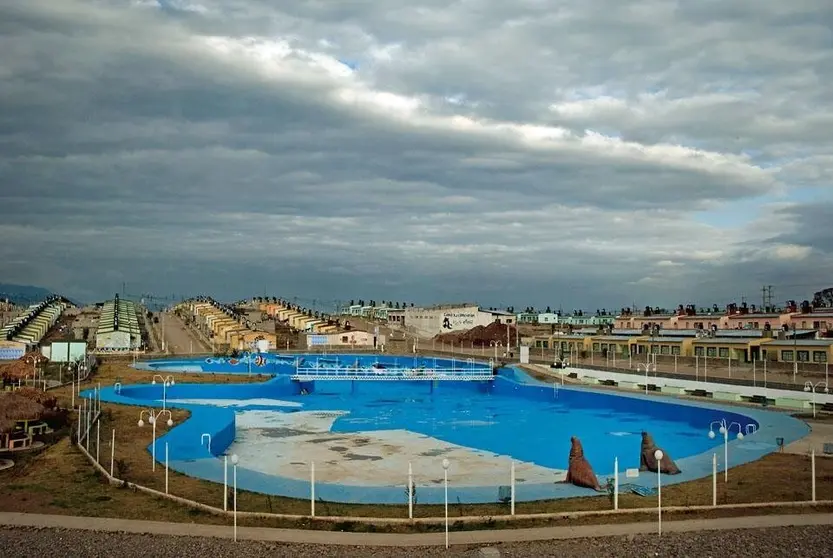
Protesters hold a placard with Argentinian social activist Milagro Sala's face and the words "Free Milagro" at a demonstration in Buenos Aires. Photo: Julieta Ferrario/Zuma Press/file photo.

Orinoco Tribune – News and opinion pieces about Venezuela and beyond
From Venezuela and made by Venezuelan Chavistas

Protesters hold a placard with Argentinian social activist Milagro Sala's face and the words "Free Milagro" at a demonstration in Buenos Aires. Photo: Julieta Ferrario/Zuma Press/file photo.
By Charo Solís – Aug 5, 2025
Milagro Sala is one of the first political prisoners of the current Argentinian democracy. The founder of the Tupac Amaru Neighborhood Organization, she led an unprecedented program of social development by the people in Jujuy province: thousands of homes, schools, health centers, and cultural spaces built by workers’ cooperatives. She was a threat to the entrenched system of political and economic power.
Since her imprisonment in 2016, her case became a symbol of the criminalization of protest and a new type of political persecution that would later be replicated at the national level. With the publication of the book Jujuy: the Laboratory of Repression by Eli Gómez Alcorta and Valeria Vegh Weis, this process can be viewed in its complexity: a systematic machinery that combines the judiciary, media, and the government to crush popular power.
Milagro Sala: a city for the poor
Milagro Sala is an indigenous leader and founder of the Tupac Amaru Neighborhood Organization (OBTA), which emerged in the late 1990s in the province of Jujuy. Her first organizational experience was the creation of milk cups (afternoon snack and playtime sessions for children) in neighborhoods without basic services, such as Alto Comedero. From there, Tupac Amaru launched an unprecedented project: thousands of social housing units, swimming pools, health centers, schools, factories, and even a water park.

At one point the organization had more than 100,000 members nationwide, and Milagro Sala was elected provincial deputy in 2013 and Mercosur parliamentarian in 2015. Her figure combined the unexpected: woman, indigenous, poor, with territorial leadership and institutional aspirations. Her popularity grew in sync with the progress of the works, and that unsettled the traditional powers of Jujuy, both political and business.
As Paula Quiroga points out in her research on the coverage about Milagro Sala by the right-wing newspaper La Nación, Sala’s media figure was shaped by stereotypes of gender, class, and race. She was portrayed as “violent,” “lawless,” and even “masculinized,” to question her legitimacy as a political and social figure.

The history of Tupac Amaru was not only captured in books. It was also portrayed in the film Amasando Futuro by Marta Valle, where one can observe a record of the impact of the collective work carried out in Jujuy: housing, schools, health and cultural centers in places where there was once only mud and snakes.
The cases and international repudiation
The criminalization of Sala began with a minor complaint in 2009 for her protest against Gerardo Morales, former governor of Jujuy, later a senator and then president of the right-wing party Radical Civic Union. In the following years, cases against her accumulated for threats, instigation to riot, and finally, illicit association and fraud against public administration.
On January 16, 2016, just a month after Morales took office as governor, Milagro Sala was arrested for leading a camp in front of the Government House. Although a judge granted her release for that case, she was immediately charged in another complaint initiated by the provincial state prosecutor. From that moment on, she remained detained without conviction for years.
International organizations denounced irregularities from the beginning. In October 2016, the UN Working Group on Arbitrary Detention described her arrest as “arbitrary” and called for her release. This was followed by statements from the OAS, Amnesty International, Human Rights Watch, and the Inter-American Commission on Human Rights (IACHR), which suggested the adoption of precautionary measures in 2017, considering that Sala was being deprived of her human rights.
In 2017, the Supreme Court of Justice of Argentina ruled that Sala be granted house arrest in accordance with the ruling of the Inter-American Court. But the Jujuy judicial system repeatedly failed to comply with that order. It was only in 2018 that house arrest was implemented, and since then it has been modified and revoked at various stages.
On July 25, 2023, the Supreme Court dismissed Sala’s final appeal and upheld the sentence of 15 years in prison and permanent disqualification from holding public positions.
Argentina’s Milagro Sala: ‘There Are Many Leaders Who Are Not in the Streets’
A rehearsal of lawfare: the Jujuy laboratory
In Jujuy: the Laboratory of Repression, Gómez Alcorta and Vegh Weis describe the Sala case as the first trial of lawfare in Argentina. Jujuy had already put into practice an effective structure of judicial, media, and political power to dismantle a people’s movement.
The authors develop the concept of “neutralizing punitivism”: a form of preemptive punishment that seeks to discipline and paralyze the political action of subaltern sectors. It is not just about imprisonment, but about sending a message to society about the limits of what is allowed.
In that framework, the media played a fundamental role. As researcher Quiroga describes, since 2009, La Nación and other hegemonic media outlets have portrayed Sala as the leader of a “parallel state,” linking her to the misuse of public funds, threats, violence, and even drug trafficking, without any evidence. The discourse of criminalization paves the way for social approval of repression. That system of vested interests combining media, judiciary, and politics is repeated against different targets, always aimed at breaking the emerging forms of popular representation.
The book shows how that repressive machinery in Jujuy later moved to the national level. The strategies of harassment, preventive detention as punishment, and convictions without solid evidence were replicated in the cases against Kirchnerista leaders, including Cristina Fernández de Kirchner. Milagro Sala was, in judicial and media terms, the “test case.”
Without an end in sight
Throughout her nine years of judicial torment, Sala not only had to deal with political persecution, which led to fraudulent trials and unjust convictions, but also suffered the tragic loss of her husband, journalist Raúl Noro, and her son, Sergio Chorolque Sala.
Today, Milagro Sala remains detained. From her home, under house arrest, she continues to condemn the repression, the austerity measures, and the plundering of lithium in Jujuy. “I have already lost everything,” she said in a recent interview. “I lost my son. They took my husband away from me. What else am I going to lose? I know that behind me, beside me, there are many colleagues who are always lifting me up. Today it is my turn to be here inside. But I am organizing. I dream of complete freedom. I dream of returning to the river, to the mountains, and walking. Chatting with comrades and returning to activism. Our country needs a lot of activists.”
The case of Milagro Sala is not exceptional. What began in Jujuy in 2016 has expanded as a logic of repression that continues without an end in sight.
Charo Solís is an Argentinian sociologist.
(Diario Red)
Translation: Orinoco Tribune
OT/SC/DZ
Support Groundbreaking Anti-Imperialist Journalism: Stand with Orinoco Tribune!
For 7 years, we’ve delivered unwavering truth from the Global South frontline – no corporate filters, no hidden agenda.
Last year’s impact:
• More than 200K active users demanding bold perspectives
• 216 original pieces published in 2025 alone
Fuel our truth-telling: Every contribution strengthens independent media that actually challenges imperialism.
Be the difference: DONATE now to keep radical journalism alive!